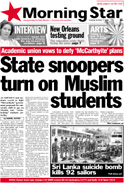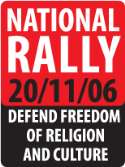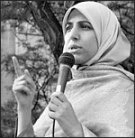 State snoopers turn on Muslim students
State snoopers turn on Muslim students
By Daniel Coysh
Morning Star, 17 October 2006
ACADEMICS and students vowed to fight “McCarthyite” government proposals for university staff to spy on Muslim and “Asian-looking” students yesterday. Lecturers’ union UCU and the National Union of Students both insisted that the proposals were unacceptable and would be vigorously opposed.
Reports said that The Department for Education and Skills (DfES) is drawing up plans to ask universities and colleges to inform on students to Special Branch. As the hysteria surrounding Islamist “extremism” threatens to completely engulf British political discourse, a leaked 18-page consultation document raised fears that Britain’s universities have become “fertile recruiting grounds” for radical groups.
But UCU joint general secretary Paul Mackney pointed out that “radicalisation is not the same as violent extremism or terrorism.”
He said: “The government’s premise is wrong. Radicalisation is not the result of Islamist segregation but government policy, especially in Afghanistan, Palestine and Iraq. UCU has expressed its concern to the minister that our members may be sucked into an anti-Muslim McCarthyism, which has serious consequences for civil liberties by blurring the boundaries of what is illegal and what is possibly undesirable.”
The document calls for university authorities to closely monitor campus Islamic societies, particularly if they invite “radical speakers” to address their meetings. It suggests that checks should be made on guest speakers at such meetings.
Fellow UCU joint general secretary Sally Hunt insisted: “We will not accept further government attempts to restrict academic freedom or free speech on campus. There is little point in having these nominal freedoms if they can be removed when certain people don’t like what they hear.”
NUS national president Gemma Tumelty warned that creating a snooping culture on Britain’s campuses could prove counterproductive to anti-terrorism measures. “Demonising and stigmatising student communities is no way to defeat terror,” insisted Ms Tumelty. “Indiscriminate monitoring of groups on campus assumes collective guilt. This will only fuel the racism and Islamophobia that our society should be trying so hard to stamp out.”
University vice-chancellors also rejected the proposals. Universities UK president Professor Drummond Bone said: “Not only is this unreasonable but, crucially, it could be counter-productive. The key to this is balance and discussion and we have made this point repeatedly to ministers.”
Continue reading →
 “I’ve been trying to imagine what it must be like to be a Muslim in Britain. I guess there’s a sense of dread about switching on the radio or television, even about walking into a newsagents. What will they be saying about us today? Will we be under assault for the way we dress? Or the schools we go to, or the mosques we build? Who will be on the front page: a terror suspect, a woman in a veil or, the best of both worlds, a veiled terror suspect.
“I’ve been trying to imagine what it must be like to be a Muslim in Britain. I guess there’s a sense of dread about switching on the radio or television, even about walking into a newsagents. What will they be saying about us today? Will we be under assault for the way we dress? Or the schools we go to, or the mosques we build? Who will be on the front page: a terror suspect, a woman in a veil or, the best of both worlds, a veiled terror suspect.
 Freedom of religion is one of our most precious democratic rights. It took hundreds of years, including international and civil wars, to establish the right of every individual to freely pursue their religious beliefs subject only to their conscience. It must be defended against every challenge.
Freedom of religion is one of our most precious democratic rights. It took hundreds of years, including international and civil wars, to establish the right of every individual to freely pursue their religious beliefs subject only to their conscience. It must be defended against every challenge. “Europe is in danger of seeing its extreme-right parties move into the mainstream. The message has changed. Anti-Semitism has metamorphosed into ‘Islamophobia’ since 9/11, finding a popular resonance with those bearing the consequences of the war on terror. Islamophobia has become the prejudice of the day, but the threat from the extreme right is real and it is found across the European Union.”
“Europe is in danger of seeing its extreme-right parties move into the mainstream. The message has changed. Anti-Semitism has metamorphosed into ‘Islamophobia’ since 9/11, finding a popular resonance with those bearing the consequences of the war on terror. Islamophobia has become the prejudice of the day, but the threat from the extreme right is real and it is found across the European Union.” “This week I’ve been told that women like myself are submissive, oppressed creatures who need rescuing by white, male politicians. But at the same time, I’ve been told that women like myself frighten white, male politicians and that we are a threat to social cohesion in this country.
“This week I’ve been told that women like myself are submissive, oppressed creatures who need rescuing by white, male politicians. But at the same time, I’ve been told that women like myself frighten white, male politicians and that we are a threat to social cohesion in this country. “It was refreshing to read the article by Martin Newland (
“It was refreshing to read the article by Martin Newland ( State snoopers turn on Muslim students
State snoopers turn on Muslim students